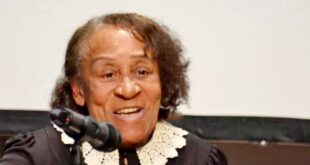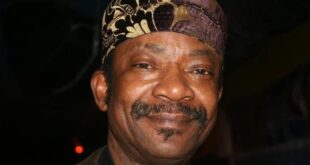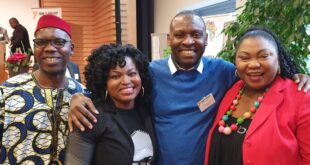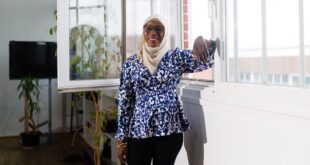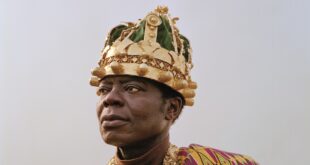The strength of Black Berlin lies in the fact that editors Omar Diallo and Joachim Zeller enlisted a large number of authors, some with a migration background, to present an all-round view. Even more interestingly, the authors, who deal with the various phases of Black life in the city during the past three centuries, represent different political and ideological hues. This makes Black Berlin a must-read.
Future scholars, researchers and historians will be happy to have such a work as reference material. Divided into four main sections, the book deals with the various aspects of the migrants’ lives and their struggle for emancipation and social justice. Integration is a key word but a very difficult undertaking.
The first part introduces the subject. Then there is the section titled African Life in the Spree Metropole 1918-1945, in which Marianne Bechhaus-Gerst portrays people from an African background in Berlin during the period 1918-1945. Stefan Gerbing looks at political intervention between the November Revolution of the sailors in Northern Germany and the Weimar Republic, while Rainer E. Lotz portrays the dancer, choreographer and actor Louis Douglas.
The section dealing with the Highlights of Afro-German History in Berlin from 1945 is alive with events and people, whereas the last section, Black Germans: Portraits and Interviews, looks at the achievements of a number of people, dead or alive, who have made their mark on the city, the most prominent being the late May Ayim (3 May 1960–9 August 1996).
In her contribution, Chantal-Fleur Sandjon talks of a very troubled person looking for an identity – a fate suffered by many children born to biracial parents. In Ayim’s case, the problem was compounded by the fact that she never knew her mother. Her father, a Ghanaian, appeared at a later stage but as “Uncle E”. Ayim was brought up in children’s homes and by foster parents. Ayim suffered racist abuse and insults throughout her entire childhood.
May Ayim’s childhood experience shaped her life in the fight against discrimination and injustice. She pursued an academic career and became a popular educator and poetess, and was a key figure in the Afro-German movement fighting for justice and recognition. Therefore, it is not surprising that with other young people, she founded the Initiative of Black Germans (Initiative Schwarze Deutsche or ISD) in 1985.
Unfortunately, in 1996 the terrible illness multiple sclerosis invaded her body and her health deteriorated rapidly, throwing her into bouts of depression. She took her own life by jumping off a high building. In 2009 the suburb of Friedrichshain-Kreuzberg honoured her by renaming a bank on the River Spree, a pedestrian thoroughfare, May-Ayim-Ufer.
The division of Germany in 1949 brought in its wake the question of the position of Black people in the two states, and Berlin in particular. Up till 1945, the Blacks who inhabited the city came mainly from the former colonies under German occupation. After the end of World War II there were “home-grown” Blacks resulting from the relationship between African-American soldiers and their local partners in occupied Germany. The offspring of such unions did not have it easy, either in Berlin or elsewhere in the country. Then there are the children of African students and German women who were regarded as a “problem” and sidelined.
What this book brings to the fore is that despite all the hurdles placed in their path, Blacks refused to cow down. On the contrary, they have made enormous contributions to the culture, economy and welfare of the city and the whole of Germany. They are not anonymous any more, especially in the sports world. The victory of Raphael Holzdeppe in the pole vault at the World Light Athletic Championships in Moscow in August is a case in point. Suddenly, this unknown Black man has become the darling of the whole country.
Black Berlin is in German and I hope it will be translated into other languages. It is really an interesting book, especially in terms of the challenges it throws up.
Eric Singh+/Photo: © Daniela Incoronato
——————————————–
*Black Berlin – die deutsche Metropole und ihre afrikanische Diaspora in Geschichte und Gegenwart By Oumar Diallo & Joachim Zeller, Metropol Verlag, ISBN 978-3-86331-132-2
 THE AFRICAN COURIER. Reporting Africa and its Diaspora! The African Courier is an international magazine published in Germany to report on Africa and the Diaspora African experience. The first issue of the bimonthly magazine appeared on the newsstands on 15 February 1998. The African Courier is a communication forum for European-African political, economic and cultural exchanges, and a voice for Africa in Europe.
THE AFRICAN COURIER. Reporting Africa and its Diaspora! The African Courier is an international magazine published in Germany to report on Africa and the Diaspora African experience. The first issue of the bimonthly magazine appeared on the newsstands on 15 February 1998. The African Courier is a communication forum for European-African political, economic and cultural exchanges, and a voice for Africa in Europe.

